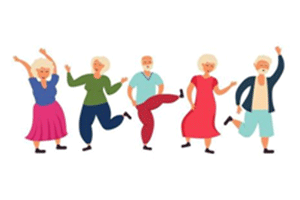
The fact that physical activity slows down aging and helps to lower the risk of many diseases has been extensively documented. But is there an evolutionary explanation for why lifelong physical activity, particularly in middle and older ages, promotes health?
The “active grandparent hypothesis” (1) is a compelling concept that suggests that grandparents’ active engagement in caregiving, social interactions, and community participation provides evolutionary advantages which benefit both their descendants and society. Interestingly, this builds on the broader “Grandmother Hypothesis” (2) which proposes that human lifespan has evolved partly because grandmothers enhance the survival chances of their grandchildren by providing essential care, knowledge, and resources. It follows that this caregiving is most effective when the grandparent remains physically able to do so.
Prehistoric Grandmothering
The extensive study of a group of hunter-gatherers in Tanzania by anthropologist Kristen Hawkes and colleagues in the 1980s (3) helped fuel the Grandmother Hypothesis. The premise is that when grandmothers step in to feed young children and perform other motherly duties, the young mothers can focus their own energy and resources on having more children at shorter intervals. Therefore, presumably, the grandmother enables the birth of more descendants, and importantly, leaves more copies of her genes in the offspring that follow. Theoretically, in prehistoric times, this grandmothering led to the proliferation of genes which corresponded to slower aging and increased lifespan expectancy.
Key Principles of the Active Grandparent Hypothesis
Evolutionary Advantage of Staying Active: Older adults who remain active can contribute more effectively to their grandchildren’s development, which increases the likelihood of those grandchildren surviving and reproducing. This, in turn, reinforces the evolutionary benefit of extended lifespan and activity in old age.
Maintenance of Knowledge and Skills: Active grandparents serve as repositories of cultural knowledge, skills, and wisdom, passing valuable information across generations.
Health and Longevity: The hypothesis also suggests a bidirectional relationship—being active promotes better health and longevity, which further extends their caregiving contribution.
HOWEVER…
You Do Not Need to Be a Grandparent for These Principles to Apply!
The active grandparent hypothesis is rooted in evolutionary theory and highlights a fascinating intersection of biology, sociology, and anthropology. It underscores why staying active is a key benefit—not just for individual health but for the continuity and resilience of human families and societies. But you just need to be a human for these principles to apply.
Research has shown time and time again that engaged, active older adults tend to experience lower rates of chronic diseases, have better mental health, and higher life satisfaction. Staying physically and socially engaged, maintaining social networks that are meaningful to us, and participating in lifelong learning that stimulates us and brings us joy make us all better citizens of our world.
References:
- Lieberman DE, et al. The Active Grandparent Hypothesis: Physical Activity and the Evolution of Extended Human Healthspans and Lifespans. Proceedings of the National Academy of Sciences of the USA (PNAS) 2021 Nov;118 (50) e2107621118.
- Hawkes K. Grandmothers and the Evolution of Human Longevity. American Journal of Human Biology 2003;15(3):380-400. doi:10.1002/ajhb.10156
- Hawkes K, et al. Hadza Women’s Time Allocation, Offspring Provisioning, and the Evolution of Long Postmenopausal Life Spans. Current Anthropology 1997; 38:551-577.

